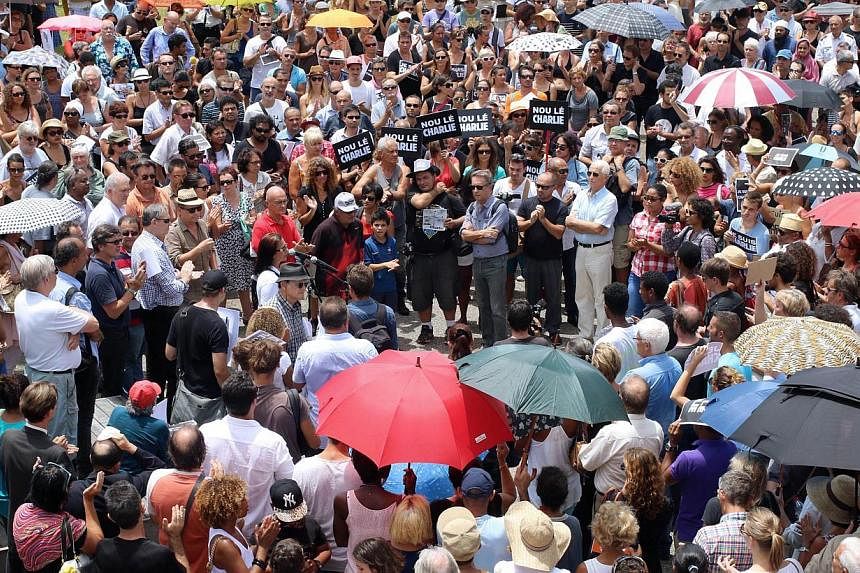BEIRUT (AFP) - The deadly attack on France's Charlie Hebdo magazine has confirmed the West's worst fears that militants will act on extremist threats to target Western countries fighting Islamic extremism.
The brazen targeting of a media outlet that sparked widespread Muslim outrage with cartoons of the Prophet Muhammad is also a powerful propaganda weapon and potential recruiting tool, analysts say.
"This attack was designed to cause shock in the international community," said Lina Khatib, director of the Carnegie Middle East Centre think-tank.
"The 'spectacular' manner in which it was executed is intended to show the influence of jihadist movements in Europe," she said.
It remains unclear whether the attackers who killed 12 people on Wednesday have direct ties to groups like the Islamic State in Iraq and Syria (ISIS) or Al-Qaeda.
No radical group has yet claimed responsibility for masterminding the assault.
But Max Abrahms, a political science professor at Northeastern University, said extremists would rally around it regardless.
"There is no question that ISIS and other jihadist groups will tout this attack as a success that should be replicated," he said.
Charlie Hebdo was no random target. Its publishing of multiple caricatures of the Prophet Muhammad caused deep outrage and its offices were fire-bombed in 2011.
- Goal to 'send a message' -
Prosecutors said witnesses heard the gunmen shout "we have avenged the prophet" as they carried out the killings.
But Khatib said the reasons for the attack likely went beyond the magazine's controversial publications.
France is a leading partner in the US-led coalition fighting ISIS, participating in air strikes against the group in Iraq.
It has also led operations against hardline groups in Africa, making it a key target of extremist ire.
The attack's goal was to "send a message to states, particularly those who are part of the international coalition fighting groups like ISIS, that they are now vulnerable," Khatib said.
"The fact that the attackers chose a central area in Paris is very symbolic... the invoking of vengeance for the prophet is just an excuse," she added.
The killings come amid resurgent fears that Islamic extremists will strike at the heart of Europe, targeting Western capitals.
Western intelligence services have warned recently of the threat posed by Europeans returning home after fighting in the ranks of militant groups in Iraq and Syria.
Thousands of Europeans are believed to have joined IS, which has declared a so-called Islamic "caliphate" in the territory it controls.
Almost 1,000 French nationals from a wide range of backgrounds are estimated to have joined jihadists in Iraq and Syria, including some 400 thought to be currently fighting on the ground and almost 50 who have been killed.
Both IS and Al-Qaeda in the Arabian Peninsula (AQAP), the jihadist network's powerful branch in Yemen, have called on followers to target France specifically.
- Extremists tout attackers -
In September, ISIS spokesman Abu Mohamed al-Adnani singled out France in a message urging followers to kill "disbelievers".
And AQAP's Inspire magazine both urged attacks against France and put Charlie Hebdo editor-in-chief Stephane Charbonnier, who was killed Wednesday, on a "Most Wanted" list.
Extremist sympathisers have expressed their approval of the attack online.
On Twitter, they touted the attack using the hashtag "Paris Invasion" and "Paris is Burning," and describing the attackers as "lions".
Some posted photos of Charbonnier holding an issue of Charlie Hebdo with cartoons depicting the Prophet Muhammad with the caption: "This is why he died."
"This attack will be seen as successful and when terrorist groups give the appearance that they're successful, it means an easier time for them in terms of attracting volunteers and recruiting," Abrahms said.

